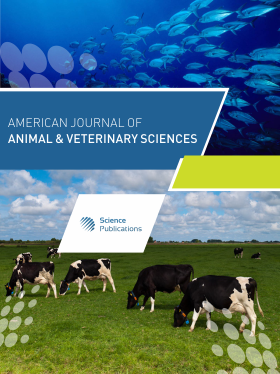Genetic Diversity Analysis of the Gohilwari Breed of Indian Goat (Capra hircus) Using Microsatellite Markers
- 1 Molecular Genetics Lab, Ranchi Veterinary College, India
- 2 National Bureau of Animal Genetic Resources, India
- 3 Birsa Agricultural University, India
- 4 College of Biotechnology, Kanke, India
- 5 National Bureau of Animal Genetic Resources, Karnal, India
- 6 Department of Animal Breeding and Genetics, Ranchi Veterinary College, India
Abstract
Problem statement: Gohilwari breed of goat is a multipurpose goat mainly for milk and meat purposes and best suited in its harsh climatic condition. This breed is inadequately characterized till now at DNA level. So the present study was undertaken for population genetic analysis at molecular level to exploit the breed for planning sustainable improvement, conservation and utilization, which subsequently can improve the livelihood of its stake holders. Approach: The experiment was conducted on 50 genomic DNA samples of unrelated goat using 25 microsatellite markers selected from the list suggested by International Society for Animal Genetics (ISAG) and FAO’s (DAD-IS). Results: All of the 25 microsatellites were well amplified. The observed number of alleles detected per locus ranged from 4-24 with an overall mean of 10.12±5.46. Overall mean observed heterozygosity of 0.505 was lower than the overall mean expected heterozygosity of 0.684. Most of the loci showed the heterozygote deficit as also depicted by Fis value. There was substantial genetic variation and polymorphism across studied loci in the Gohilwari breed of goat. And this population was not in Hardy-Weinberg equilibrium at most of the studied loci. This population was also receiving new genetic materials through introduction of immigrants. Conclusion: The strong inference that the Gohilwari breed of goat has not undergone bottleneck is also important for goat breeders and conservationists, as it suggests that any unique alleles present in this breed may not have been lost. Therefore, it can be recommended that within-breed diversity is actively maintained to enable these extensively unmanaged stocks to adapt to future demands and conditions and there is ample scope for further improvement in its productivity through appropriate breeding strategies. Though, microsatellites are neutral to selection with Ewens-Watterson test for neutrality some microsatellites were found not neutral or linked to some selective trait that must be further investigated for association to selective traits.
DOI: https://doi.org/10.3844/ajavsp.2009.49.57

- 5,200 Views
- 5,665 Downloads
- 29 Citations
Download
Keywords
- Microsatellite
- Gohilwari
- goat
